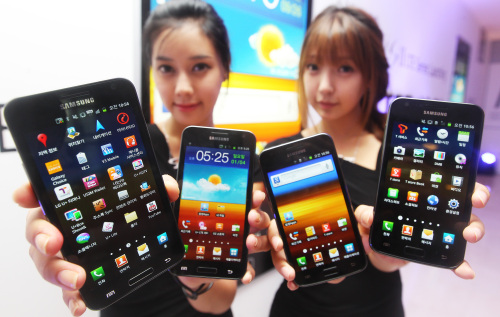New cellphones boast higher speed but will be more expensive
Long-term-evolution mobile phones are here to stay, but consumers will not be fully appreciating the savvy new cells on account of a myriad of barriers that include a lack of nationwide networks and an inevitable increase in data fees.
Major phonemakers such as Samsung Electronics and HTC have recently been competing to roll out the fourth-generation LTE phones which boast a data transmission speed of up to five times faster than the current third-generation network.
Next month, other phonemakers such as LG Electronics and Pantech also are expected to join the LTE race.
But obvious drawbacks are causing consumers to think twice about getting an LTE phone.
The biggest problem is that the 4G network is not yet available on a nationwide basis, meaning that with the exception of metropolitan cities, consumers in most parts of the country do not have access to the up-to-date network. Instead, they would have to use the existing third-generation networks.
LG Uplus, which began fourth-generation services earlier this year, has plans to expand, but not until next year. SK Telecom and KT Corp. are expected to offer nationwide services starting in 2013.
Another issue is the cost.
Telecom companies have long been complaining about the limitless data phone plans, calling on the government to ban the services as it eats into their profit.
This week, the Korea Communications Commission will be setting the guidelines for SK Telecom’s phone plans.
 |
(Yonhap News) |
SK Telecom had been forced to defer its announcement of 4G network services on several occasions this year because it was unable to reach a consensus with the KCC on the level of fees.
This is because LTE phone plans will not be offering limitless data plans, meaning consumers will have to bear a bigger burden in terms of phone bills.
The KCC has been hemming and hawing on the decision as consumers would most likely be up in arms once they find out they will no longer have access to limitless data plans.
“The KCC also is not eager to reach a deal since the higher fees will be a blow to its policies for trimming phone bills,” said one industry watcher.
The guidelines for SK Telecom will be significant for both the phonemakers, most of which have already chosen SK as their network partner,, and the network providers, such as LG Uplus, which will most likely follow once the standards have been set.
Another drawback for LTE phones is that the fourth-generation networks are not as fast as theory.
Phonemakers and network providers say 4G phones are about five times faster than 3G phones, but experiments conducted at the launching events have shown that the speed does not live up to theory.
The data transmission speed of the average 4G phone was about 20Mbps to fall far below the advertised 75Mbps. If more people log on simultaneously, the speed may further slow, industry experts said.
They added that in order for LTE phones to take off in earnest, the government and network servicers must work together to keep the phone bills at a minimum, while at the same time providing top-of-the-line services to customers who have been eagerly awaiting the next-generation phones.
By Kim Ji-hyun (
jemmie@heraldcorp.com)





![[Herald Interview] 'Trump will use tariffs as first line of defense for American manufacturing'](http://res.heraldm.com/phpwas/restmb_idxmake.php?idx=644&simg=/content/image/2024/11/26/20241126050017_0.jpg)


